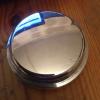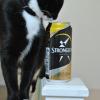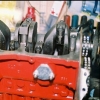Don't you swear at me.... lol
No really, honing is a precise and very accurate method of making a hole round whilst also creating a surface that holds oil for piston lubrication, glaze busting is a bodge to help an ailing engine, it has no accuracy and can at best only straighten an already honed bore that has wear, it will NOT correct for any out of roundness, a honing tool will correct for out of roundness and also maintain straightness within very tight tolerances.
Also trying to measure a bore with a vernier is not even close to being a correct tool, it has too few decimal places and has the wrong contact type, a bore micrometer will have the correct contact points but normally have 3 points at 120 degrees or better at odd degrees, then there is the bore gauge, which as a minimum requires a setting ring close to your bore requirements, but if a bore gauge is used you can run it up and down the bore and at different points around the bore to check for taper, barrelling etc etc.
Right I see, so Im guessing I'll only have more of an idea if its been honed or glazed busted if I was to use a bore gauge which would highlight any tapering or barrelling, and a bore micrometer to know the exact bore diameter. This is something to have some further consideration I suppose in terms of boring out the engine to a larger diameter if I do require new pistons to the ones I currently have.....
Back to the cylinder head I am going to knock up a spreadsheet over the weekend of parts and prices, then post on here. Are more expensive valves i.e Rimflow valves, worth the extra cash compared to the cheaper alternatives or are the just a 'brand' name valve which adds on that extra price? And with loking to modify the cylinder head would I need to upgrade to competition valves or Rimflo's?
Also valve guides, at what stage of modification to the head di you need to upgrade th valve guides to bronze alternatives?
Valves are available in different qualities and different prices, the best on the market for Mini are Paul Ivey's valves, he is tied in with another company that makes his valves, Rimflow are his valves and the concept is very good, the quality is excellent, but to be efficient they need to be run with a high enough CR and a good enough spark to keep the reversal groove clean, you will need to spend the money on an ECU so as to get the best from the,
There are excellent valves available and unless you choose a 286 or higher spec cam you won't really need them to be too exotic.
Valve guides are down to type of use and valve stem material, but for your engine I would choose valves that are a good quality but work with cast iron guides, as they are cheaper (not a massive amount) but more importantly last longer.
Competition valves, are just a good quality valve that can withstand higher speeds..
A valve has to start, stop. start, stop, and that is just one open and close, the faster the engine revs the faster and more times per second the valve has to open and close, inertial forces go through the roof, so what engine speed are you aiming for ?
Rimflow = competition, it is just a special head machining operation that adds a groove around the top face of the valve to aid flow.
















